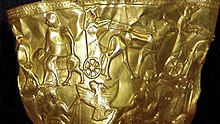The Golden bowl of Hasanlu (Persian: جام طلای حسنلو) is an ancient artefact, a cup or bowl in gold, decorated in relief, and now in the National Museum of Iran. It was discovered by Robert H. Dyson in 1958 while excavating the site of Teppeh Hasanlu, near the city of Naghadeh, in northwest Iran. The bowl is estimated to date from about 800 BC.[1]
| Golden cup of Hasanlu | |
|---|---|
 | |
| Material | gold |
| Size | height:21 cm diameter:21 cm |
| Created | 800BC |
| Period/culture | civilization before Medes |
| Discovered | 1958 |
| Place | Teppeh Hasanlu, Iran by Robert Dyson |
| Present location | National Museum of Iran |
Decoration
editThe reliefs show a complicated scheme with many figures, including several gods, various animals, sacrificing, and combat. It is mostly divided into two registers, with the gods, riding chariots and with winged heads, at the top.[2]
References
edit- ^ "The Hasanlu Gold Bowl". Penn Museum. Retrieved 17 September 2018.
- ^ Dyson, Robert H. Jr. (2003). "ḤASANLU TEPPE ii. THE GOLDEN BOWL". Encyclopaedia Iranica, Vol. XII, Fasc. 1. pp. 45–46.